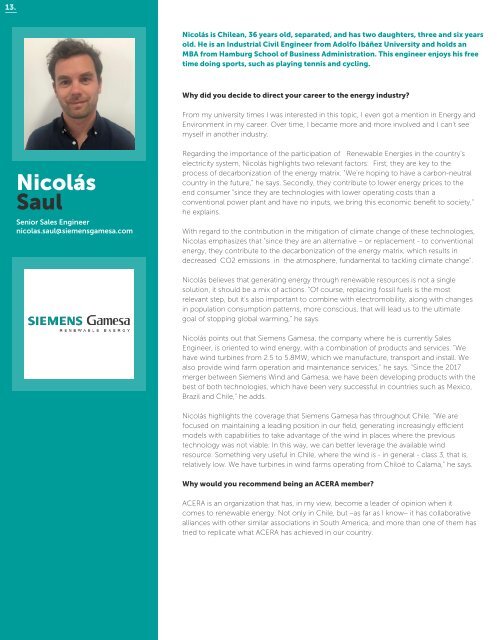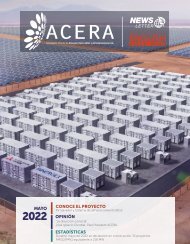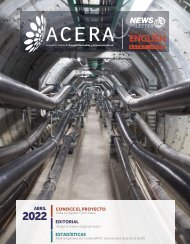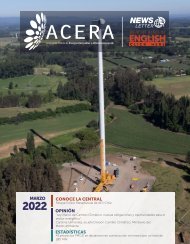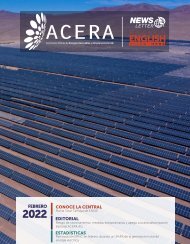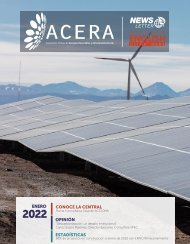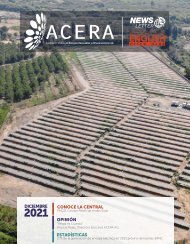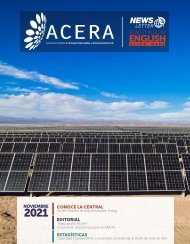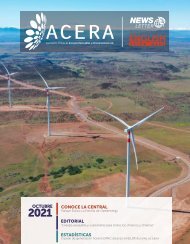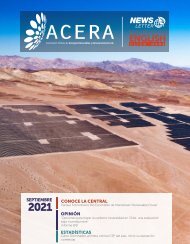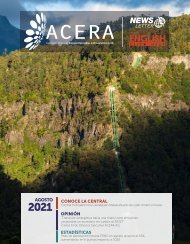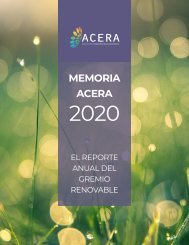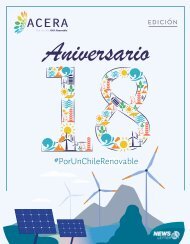Newsletter ACERA - Febrero 2020
Create successful ePaper yourself
Turn your PDF publications into a flip-book with our unique Google optimized e-Paper software.
13.<br />
Nicolás is Chilean, 36 years old, separated, and has two daughters, three and six years<br />
old. He is an Industrial Civil Engineer from Adolfo Ibáñez University and holds an<br />
MBA from Hamburg School of Business Administration. This engineer enjoys his free<br />
time doing sports, such as playing tennis and cycling.<br />
Why did you decide to direct your career to the energy industry?<br />
From my university times I was interested in this topic, I even got a mention in Energy and<br />
Environment in my career. Over time, I became more and more involved and I can't see<br />
myself in another industry.<br />
Nicolás<br />
Saul<br />
Senior Sales Engineer<br />
nicolas.saul@siemensgamesa.com<br />
Regarding the importance of the participation of Renewable Energies in the country’s<br />
electricity system, Nicolás highlights two relevant factors: First, they are key to the<br />
process of decarbonization of the energy matrix. "We're hoping to have a carbon-neutral<br />
country in the future," he says. Secondly, they contribute to lower energy prices to the<br />
end consumer "since they are technologies with lower operating costs than a<br />
conventional power plant and have no inputs, we bring this economic benefit to society,"<br />
he explains.<br />
With regard to the contribution in the mitigation of climate change of these technologies,<br />
Nicolas emphasizes that "since they are an alternative – or replacement - to conventional<br />
energy, they contribute to the decarbonization of the energy matrix, which results in<br />
decreased CO2 emissions in the atmosphere, fundamental to tackling climate change".<br />
Nicolás believes that generating energy through renewable resources is not a single<br />
solution, it should be a mix of actions. "Of course, replacing fossil fuels is the most<br />
relevant step, but it's also important to combine with electromobility, along with changes<br />
in population consumption patterns, more conscious, that will lead us to the ultimate<br />
goal of stopping global warming," he says.<br />
Nicolás points out that Siemens Gamesa, the company where he is currently Sales<br />
Engineer, is oriented to wind energy, with a combination of products and services. "We<br />
have wind turbines from 2.5 to 5.8MW, which we manufacture, transport and install. We<br />
also provide wind farm operation and maintenance services," he says. "Since the 2017<br />
merger between Siemens Wind and Gamesa, we have been developing products with the<br />
best of both technologies, which have been very successful in countries such as Mexico,<br />
Brazil and Chile," he adds.<br />
Nicolás highlights the coverage that Siemens Gamesa has throughout Chile. "We are<br />
focused on maintaining a leading position in our field, generating increasingly efficient<br />
models with capabilities to take advantage of the wind in places where the previous<br />
technology was not viable. In this way, we can better leverage the available wind<br />
resource. Something very useful in Chile, where the wind is - in general - class 3, that is,<br />
relatively low. We have turbines in wind farms operating from Chiloé to Calama," he says.<br />
Why would you recommend being an <strong>ACERA</strong> member?<br />
<strong>ACERA</strong> is an organization that has, in my view, become a leader of opinion when it<br />
comes to renewable energy. Not only in Chile, but –as far as I know– it has collaborative<br />
alliances with other similar associations in South America, and more than one of them has<br />
tried to replicate what <strong>ACERA</strong> has achieved in our country.


